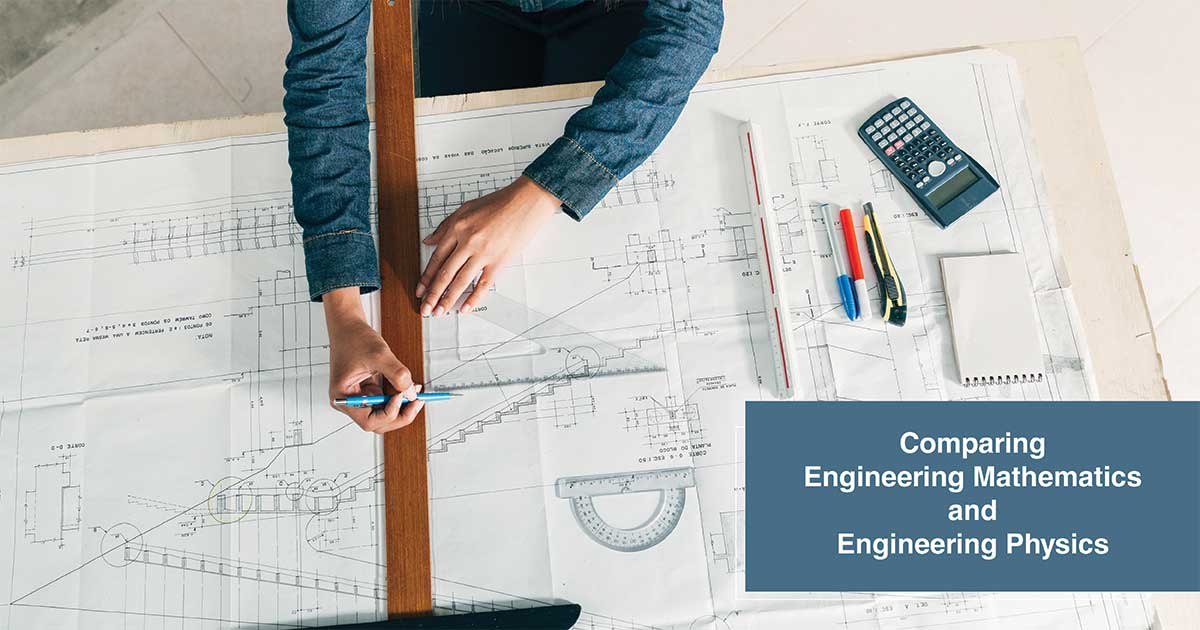FET Blogs


FET Blogs



10 April 2024
Table of Contents:
The field of engineering is all about applying science or mathematics to problems or innovations that scientists come up with. It is a part of STEM education that engages students in science, technology, engineering and mathematics. Engineering applications are used everywhere, from prosthetics and cell membranes to construction and transportation.
Engineering physics is a blend of combined disciplines involving mathematics, engineering, chemistry and physics in multiple ways to develop and design innovative solutions. On the other hand, engineering mathematics is a branch of engineering concerned with mathematical methods and techniques that find their uses in various industries. The mutual relationship between these two fields plays a crucial role in developing innovative solutions and problem-solving in engineering.
Typically, an engineering degree, i.e. a Bachelor of Engineering (B.E.) is an academic degree that takes four years to complete. While studying for a bachelor’s in engineering, a student is offered various subjects spanning multiple disciplines. There can be specialisations or specific concentrations within the engineering field that can be studied, and mathematics and physics are amongst the common subjects that form a part of a B.E. degree. Since these are foundational courses, they usually begin in the initial semesters. They are spread across multiple semesters, going from beginner to advanced level, as they form the fundamental blocks for the engineering degree.
Engineering physics reduces the gap between practical engineering and theoretical science, focusing on design, analysis, research and development. Topics covered may include main areas of engineering such as:
Engineering mathematics is an interdisciplinary subject that answers engineer’s needs for practical and theoretical specialisations and helps solve engineering problems. Topics that engineering mathematics consists of primarily include:
Engineering physics bridges the fundamental laws of physics and their practical implementation in engineering design and technology. It is crucial in developing innovative solutions and advancing technology across various engineering disciplines. If you are interested or passionate about creating and testing systems or mechanical/electrical components of machines, then engineering physics is the path to take. You can find a career in various industries with a degree in engineering physics. Some career options might include:
Engineering mathematics is a multifaceted discipline that provides the analytical tools engineers need to understand, model, and optimise complex systems. An engineering mathematics degree can equip you with skills opening doors for various industry careers. A few potential career opportunities that you can look forward to are:
Both engineering mathematics and physics are unique in their ways, but the choice of moving forward with either of the specialisations depends on your future career goals and objectives. You can take these subjects as standalone or pursue them as a part of the integrated broader specialisation. Mathematics and physics are relevant for various job roles, as stated above. They are proficient in leveraging data-driven decision-making and can be considered good options as you embark on your engineering journey. The future of engineering solutions will undoubtedly be significantly influenced by the joint efforts of mathematicians and physicists within the engineering community as technology continues to progress.
A1: Yes, engineering physics is worth it for those who are interested in engineering and science. In India, graduates often find roles in research labs, aerospace, semiconductors, biotechnology and renewable energy, with starting salaries of ?5-7 LPA and potential to reach up to ?15-20 LPA in specialised sectors.
The degree opens opportunities in a wide range of fields, including the aerospace industry and advanced research.
A2: Engineering is a combination of both physics and math, but the balance depends on the specific engineering discipline. Mechanical engineering tends to use more applied math, while electrical or aerospace engineering focuses on physics concepts.
Generally, mathematics provides the tools to model systems, while physics offers the foundational knowledge behind how those systems work.
A3: Yes, engineering physics is a good option for those interested in technology and research. Indian Institutes such as IITs and IIST offer BTech programmes that combine rigorous physics and engineering.
Graduates are well-placed in industries such as aerospace, defence, IT, research labs and multinational companies.
However, it is intensive and demands hard work and dedication. Students should choose the course based on career objectives, like pursuing research or higher studies.
A4: It depends on one’s interest in a particular subject. Pure mathematics can be more abstract, while physics applies mathematics to explain and understand various natural phenomena.
Engineering uses maths practically, whereas physics may involve deeper reasoning, especially in areas like quantum mechanics.
Popular Post
17 February 2026
AIE Full Form
10 February 2026
AEIE Full Form
22 January 2026
AE Full Form
16 January 2026
What is Aerospace Engineering?
16 January 2026
What is Chemical Engineering?
Ask an Expert for Free